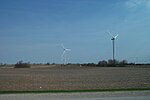Lomira, Wisconsin
1849 establishments in WisconsinPopulated places established in 1849Use mdy dates from July 2023Villages in Dodge County, WisconsinVillages in Wisconsin

Lomira is a village in Dodge County, Wisconsin, United States. The population was 2,430 at the 2010 census. The village is located within the Town of Lomira, at the crossroads of State Highways 49, 67 and 175, and Interstate 41.
Excerpt from the Wikipedia article Lomira, Wisconsin (License: CC BY-SA 3.0, Authors, Images).Lomira, Wisconsin
Muehlius Lane, Town of Lomira
Geographical coordinates (GPS) Address Nearby Places Show on map
Geographical coordinates (GPS)
| Latitude | Longitude |
|---|---|
| N 43.5775 ° | E -88.447222222222 ° |
Address
Muehlius Lane
Muehlius Lane
53048 Town of Lomira
Wisconsin, United States
Open on Google Maps









